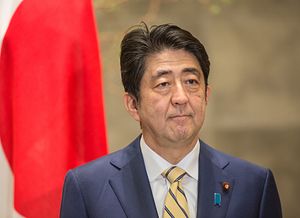Seven Japanese nationals were killed in the hostage crisis that unfolded in Dhaka, Bangladesh, a week ago. Their bodies were repatriated to Tokyo on Tuesday. One Japanese national survived, and is currently receiving treatment for a gunshot wound in a Tokyo hospital.
The eight Japanese who were caught at an upscale cafe last Friday night by Islamic extremists were in the country working as consultants on a Japan International Cooperation Agency (JICA) development project.
After a ceremony to welcome the bodies back to Japan, Japanese Foreign Minister Fumio Kishida told reporters, “It is extremely regrettable that precious lives were lost in a savage and heinous terrorist attack. … I felt deep sorrow and strong indignation.”
The Emperor and Empress also conveyed their grief through an aide.
On Tuesday, Prime Minister Shinzo Abe called a Cabinet meeting where he pledged to stand firm against terrorism: “Our country will not give into terrorism. We will coordinate moves with the international community to eradicate terrorism.”
Japan has already taken some steps in response to the Dhaka tragedy. A day after the attack, Visiting State Minister for Foreign Affairs Seiji Kihara visited Bangladesh and met with Bangladeshi Prime Minister Sheikh Hasina. He asked for Bangladesh’s cooperation to combat terrorism.
Also on Sunday, U.S. Ambassador to Japan Caroline Kennedy reaffirmed the United States’ commitment to work with Japan to combat terrorism.
What does combating terrorism mean in practical terms for Japan? Considering Japan’s past behavior, this likely entails giving more aid to other countries combating terrorism on the front lines – but no actual Japanese forces or assets being deployed. Though there was some domestic criticism against Abe’s poverty alleviation initiative to help states fighting the Islamic State (ISIS), such as Turkey and Lebanon, for having possibly led to ISIS executing two Japanese hostages shortly after, there is really nothing else Japan can do.
Simply put, even the most heinous terrorist attacks – attacks that by design or, more likely, by coincidence, victimize Japanese nationals – abroad cannot galvanize a complacent Japanese public. Japan has long ago forsaken the use of its highly capable military as a foreign policy tool because of the domestic political and regional diplomatic challenges that such an endeavor would face. This is not to automatically say that use of Japan’s Self-Defense Forces (SDF) would be the most effective use of Japanese resources in the ubiquitous fight against terrorism, but it is disconcerting that such a debate cannot even take place within a country that wants to make a “proactive contribution” to peace.
Whether the recent radicalization of individuals in Bangladesh will lead to an increase or decrease in Japanese official development aid (ODA) remains to be seen. Increasing it would be the natural response, but if concerns about how to deliver this aid to Bangladesh are too great, there could be a dip. Kishida plans to convene a meeting of Foreign Ministry and JICA officials soon to discuss safety measures for projects in developing countries financed by Japanese ODA, and the group aims to release their findings by August.
Japanese nationals in Dhaka have expressed concerns about their safety in the country; while some remain defiant and have recommitted their determination to see Bangladesh’s development through, others are ready to pack up and leave a country that has turned to such violence. Several Japanese aid groups have suspended or are considering suspending their activities in the country, including Kansai Bangladesh Group, Asia Arsenic Network, and NPO Shapla Neer. These groups lead a variety of projects in Bangladesh, including supplying electricity, supporting child education, and tackling groundwater pollution problems.
Japanese aid groups were already concerned when an Italian and a Japanese were killed in separate incidents last year while they were participating in aid activities in Bangladesh.
Furthermore, Yukiko Fujisaki, Shapla Neer’s Dhaka office director, believes that Abe’s January 2015 commitment to provide $200 million to Middle Eastern countries fighting the Islamic State has increased the danger to Japanese aid workers. Fujisaki said to Asahi Shimbun, “Since that remark, Japanese people have been targeted by terrorists.” Her response to these concerns is quintessentially Japanese: “In order to eradicate terrorism, we should devote our energy to measures to solve poverty.”

































